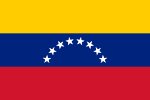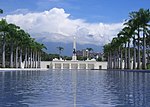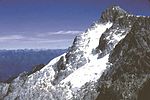Spanish 1/The Household
Chapter 13 (The Household)
[edit | edit source]Location
[edit | edit source]- cerca - close, near
- lejos - far
- vivir - to live
Rooms in a house
[edit | edit source]- apartamento - apartment
- baño - bathroom
- cocina - kitchen
- comedor - dining room
- cuarto - room
- despacho, la oficina - home office
- escalera - stairway
- garaje - garage
- piso - story, floor
- planta baja - ground floor
- primer piso - first floor
- sala - living room
- segundo piso - second floor
- sótano - basement
- ático - attic
Chores
[edit | edit source]- arreglar el cuarto - to straighten up the room
- ayudar - to help
- cocinar - to cook
- cortar el césped (la grama) - to cut the lawn
- dar - to give
- dar de comer al perro - to feed the dog
- hacer la cama - to make the bed
- lavar - to wash
- limpiar el baño - to clean the bathroom
- pasar la aspiradora - to vaccum
- poner - to put, place
- pongo - I place
- pones - you place (singular)
- poner la mesa - to set the table
- quehaceres - chores
- quitar el polvo - to dust
- sacar la basura - to take out the trash
Note: The first person conjugation for dar is doy.
Clean or dirty
[edit | edit source]- limpio(a) - clean
- sucio(a) - dirty
Other words
[edit | edit source]- bastante - enough
- ¿Cuáles? - Which? (plural)
- dinero - money
- un momento - a moment
Useful expressions
[edit | edit source]- ¿Qué estás haciendo? - What are you doing?
- recibir - to receive
- si - if, whether
Affirmative tú commands
[edit | edit source]In Spanish, there are two ways to tell someone to do something, the tú form is used in the same way the word is used, with friends, family, younger people, and people you know. The tú commands use the Ud./él/ella conjugations. Below is the list of ending for the affirmative tú commands, the same as the Ud./él/ella conjugations.
-ar: -a
-er: -e
-ir: -e
Examples:
- habla - talk
- lee - read
- escribe - write
There are eight irregular affirmative tú command conjugations for these words:
- decir - to say, to tell
- hacer - to do, to make
- ir - to go
- poner - to put, place
- salir - to leave, go out
- ser - to be
- tener - to have
- venir - to come
Their conjugations for affirmative tú commands are:
- di - say
- haz - do
- ve - go
- pon - put
- sal - leave, go out
- sé - be
- ten - have
- ven - come
Note: The command ve is regular for the verb to see: ver.
Present progressive tense
[edit | edit source]The present progressive tense tells what is happening right now, and when conjugated in Spanish, the equivalent in English is -ing. Below is the list of conjugations for the present progressive tense in Spanish:
-ar: -ando
-er: -iendo
-ir: -iendo
Examples:
- lavando - washing
- comiendo - eating
- escribiendo - writing
There are a few irregular present progressive conjugations in Spanish; one example is leer.
- leyendo - reading
Etc.
[edit | edit source]- coche - car
Note: In the United States and in northern Mexico, carro is usually used side-by-side with coche.
Vocabulario adicional
[edit | edit source]- estufa - stove
- jardín - garden
- lavadero - laundry room
- lavadora - washing machine
- lavaplatos - dishwasher
- muebles - furniture
- patio - patio
- refrigerador - refrigerator
- secadora - clothes dryer
- sillón - armchair
- sofá - sofa
- tocador - dressing table
- quitar - to remove
- quitar la nieve con la pala - to shovel snow
- quitar los platos de la mesa - to clear the table
- rastrillar las hojas - to rake leaves
Cultural Insight (Houses in Spanish-speaking countries)
[edit | edit source]In Spanish-speaking countries, houses tend to be viewed as more private than in the most parts of the world. Bars will usually be placed on the windows of first floor rooms of the house and a patio would be located at the center of the house or apartment buliding. Usually, the patio would be decorated with plants and a fountain. A gate would separate the driveway from the sidewalk and a fence would separate the house from a neighbor's.
Country Focus (Venezuela)
[edit | edit source]

Venezuela (Spanish: Venezuela) is a country on the northern coast of South America.
The country comprises a continental mainland and numerous islands located off the Venezuelan coastline in the Caribbean Sea. The Bolivarian Republic of Venezuela possesses borders with Guyana to the east, Brazil to the south, and Colombia to the west. Trinidad and Tobago, Grenada, St. Lucia, Barbados, Curaçao, Bonaire, Aruba, Saint Vincent and the Grenadines and the Leeward Antilles lie just north, off the Venezuelan coast. Falling within the tropics, Venezuela sits close to the equator, in the Northern Hemisphere.
A former Spanish colony, which has been an independent republic since 1821, Venezuela holds territorial disputes with Guyana, largely concerning the Essequibo area, and with Colombia concerning the Gulf of Venezuela. In 1895, after the dispute over the Guyana border flared up, it was submitted to a neutral commission, which in 1899 decided it mostly in Guyana's favour. Today, the Bolivarian Republic of Venezuela is known widely for its petroleum industry, the environmental diversity of its territory, and its natural features.

Venezuela is among the most urbanized countries in Latin America; the vast majority of Venezuelans live in the cities of the north, especially in the capital Caracas which is also the largest city. Other major cities include Maracaibo, Valencia, Maracay, Barquisimeto, Ciudad Guayana and the popular tourist city of Mérida. Venezuela is also home to a diversity of wildlife in a variety of protected habitats.
Venezuela's heritage, art, and culture have been heavily influenced by its Latin American context. These elements extend to its historic buildings, architecture, art, landscape, boundaries, and monuments. Venezuelan culture has been shaped by indigenous, Spanish and African influences. Before this period, indigenous culture was expressed in art (petroglyphs), crafts, architecture (shabonos), and social organization. Aboriginal culture was subsequently assimilated by Spaniards; over the years, the hybrid culture had diversified by region.

Factbox:
-Official Languages: Spanish
-Other Languages: Native American languages
-Capital: Caracas
-Government: Democracy
-Area: 912,050 sq km (353,841 sq mi) (33rd)

-Population: 26,814,843 (40th)
-Religion: Christianity (Catholic 96%, Protestant 2%) 98%, Buddhism 0.2%, other (Traditional beliefs, Judaism) 1.8%
-Human Development: 0.844 (58th, HIGH)
-Independence: July 5, 1811
-Currency: Venezuela bolívar
